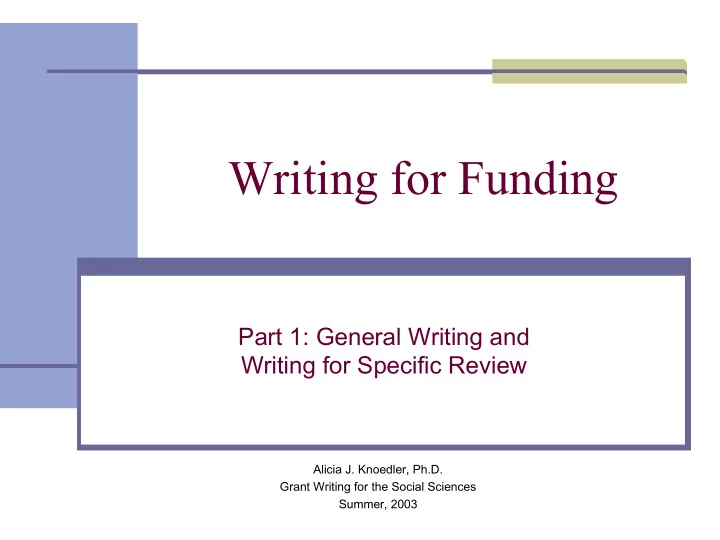

Writing for Funding Part 1: General Writing and Writing for Specific Review Alicia J. Knoedler, Ph.D. Grant Writing for the Social Sciences Summer, 2003
Writing Discussions � Part 1: Getting Started � General writing comments and suggestions � Knowing what you need to write � Planning your time � Part 2: Writing Grants in Sections � Cover letters � Abstracts � Research Plans/Project Descriptions � Letters of Support � Other items � Part 3: Everything else � What not to do when writing � Looking ahead: Budget justifications, responses to reviews 2
Stuff I just have to say first…. � You have to READ carefully to WRITE carefully � Instructions � Review Criteria � Guidelines � Reviewer comments � You have to KNOW your topic to WRITE convincingly � Logic is very important � Professional enthusiasm is a must 3
Two biggest problems I see… � LACK OF LOGICAL THOUGHT AND COMMUNICATION � NOT FOLLOWING THE INSTRUCTIONS 4
Hurdles to Jump in Writing � Your level of skill in writing � Your level of motivation � Your level of understanding � Your ability to edit your own writing � Your colleagues willingness to read (and your willingness to let them read) your writing � Emphasis is on you 5
Writing Skill � No minor errors – spelling, grammar, subject/verb agreement, number agreement � Word choice – do not be redundant, use synonyms; no contractions � Try to avoid passive verb tense � Avoid jargon – write for a knowledgeable audience but define terminology essential for your topic � Scientific Sponsor (NIH, NSF) – jargon is ok � Private Foundation – jargon is not appropriate � First vs third person – which is better? � Be aware of what you have already written – repeat yourself only to emphasize important points 6
Motivation � Write when you are motivated; don’t write if you are dreading it � If you are not motivated to write, you probably won’t write with enthusiasm (which could then hurt your proposal) � Try to write one hour per day (at least) � System of rewards to enhance motivation � Develop a set of writing goals � Set aside your writing for a while before editing 7
Knowledge of your Topic � Believe that you are the EXPERT on your topic – and write like you are � Make sure that you have thoroughly thought about the various views on your topic � Be familiar with opposing views and consider /address them in your writing � Develop the logical progression of thought on your topic BEFORE you start writing (i.e., create an outline) � Theory – introduce your theory at the outset, discuss the prior research, your current research, this research project and wrap back around to consider the theory again. 8
Editing and Revising � Time is your ally in editing your own work � Start early to allow yourself time to edit and revise � Determine the best way to edit your own work � Print a hard copy, read from beginning to end, mark your comments in an ink color other than black � Read your draft on the computer and make changes as you go � Edit in sections* 9
Constructive Criticism from Others � Mutual favor exchange � Select a range of reasonable critics � Realize the amount of work you are asking someone to do � Be suspicious of anyone who returns your work without any negative comments � Hand over your work with instructions, context, background � Give a deadline if possible 10
If I were writing a grant proposal... Complete the forms – as many as possible without having to 1. ask for help Create a checklist of items I must consider in the research 2. plan/project description Create an outline blending my approach with what is required 3. Write the research plan/project description section by section 4. Put writing aside for 2-3 days; go back to forms or ask 5. someone for help with budget and other items Read the research plan/project description, making notes for 6. improvement and placement of transitions Revise research plan/project description and give to two 7. colleagues for comments Discuss colleagues’ comments with them and make 8. appropriate changes Pull entire grant proposal together and run through for final 9. changes, additions, etc. 11
Knowing what you need to write NIH – Form instructions and program announcements (example given in class – � http://grants.nih.gov/grants/guide/pa-files/PA-03-108.html) Significance � Approach � Innovation � Investigator � Environment � NSF – Review Criteria � Intellectual Merit � Broader Impacts � NEH � Questions to address (9 questions read in class; � http://www.neh.fed.us/grants/guidelines/fellowships.html#howto ) Review Criteria � Significance of the contribution that the project will make to knowledge in the � specific field and to humanities generally Quality or promise of quality of the applicant’s work as an interpreter of the � humanities Quality of the conception, definition, organization, and description of the project � Likelihood that the applicant will complete the project � 12
Planning your Time � Always have a plan � Your plan will probably take twice as long to implement than you expect � Having practiced skills (forms, writing, math, knowing your limits) will cut down on frustration and time wasted � Work backwards from the deadline (also think about deadline and review time relative to when you need the money) � Remember other items that take a while – departmental approval, college approval, university approval � Whatever you do, DO NOT LEAVE THINGS UNTIL THE LAST MINUTE 13
Recommend
More recommend